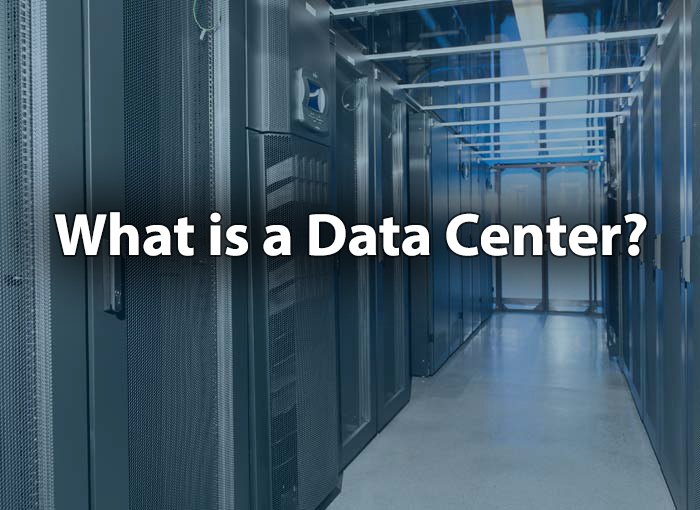What is a Data Center? (A Basic Guide) no comments

You don’t have to be a tech startup to benefit from ready access to your data. Digital information is becoming increasingly important to companies of all sizes in all kinds of industries. Data centers let you store, modify, access and back up your data safely, reliably and economically. Here’s how they work and why they might be right for your organization.
Data Center Basics
Data centers are dedicated physical facilities that house the networked computer equipment that contains your information. Although their design varies, the majority include some of the following common elements:
Servers
Servers are computers made to be constantly running. Unlike your personal desktop or laptop, most servers are headless, meaning that they lack monitors, keyboards and other interfaces that facilitate direct human interaction. Instead, they connect to other servers and clients via local network and internet connections. For instance, when you access your favorite websites, you’re really sending a request to a remote server that responds with the information needed to display the pages you want.
Racks
Servers are made to be compact, and racks let you stack armies of them in a small space. Racks may house their own cooling devices and monitoring components. Some even include custom components, vibration absorbing materials and soundproofing elements. Rack units come in a number of standardized sizes made for various equipment. Their design makes it possible to mount shared power units, route cables neatly and install servers in a fashion that permits free air flow.
Network Infrastructure
Linking servers together requires more than just network cables. Like the home or office networks that you might be familiar with, these systems require switches, routers, firewalls and other connecting hardware that controls the flow of data and permits secure external access between a remote client and a server. Most data centers feature redundant network connections from multiple Internet Service Providers (ISPs), allowing them to have a bandwidth capacity of more than 10,000x that of a typical office cable internet connection. This redundancy also allows some data centers the ability to offer Network Uptime Guarantees or Service Level Agreements (SLA) to their clients.
Environmental Systems
Even though racks and servers commonly have their own local cooling fans and ducts, all of the heat that they cast off has to end up somewhere. Cooling systems ensure that your data center doesn’t turn into a hot sauna by circulating air inside the facility, controlling moisture levels and exchanging heat using an air conditioner or similar device. These systems must be capable of constantly running since servers generate significant heat even when they’re not chugging along at full steam. Temperature management is one of the most important aspects of operating a data center. Proper cooling saves expensive equipment from overheating, shutting down unexpectedly or sustaining permanent damage.
Performance Monitoring Equipment
How do you know when your office server is running smoothly? Although checking your website is one option, it’s not very effective at stopping problems in advance. Performance monitoring devices featured in data centers let engineers observe the conditions in their facilities to ensure that everything is going according to plan. Tracking different variables, such as temperatures, power usage, and network activity give data centers deeper insights into the overall performance of your company’s servers, allowing them to take specific actions in case of problematic conditions.
Power Infrastructure
Most data centers feature power distribution units, or PDUs, and components like uninterruptible power supplies, or UPS, that continue providing electricity in case of blackouts. Data centers will also incorporate backup generators to ensure continuous power is delivered to your IT equipment in the event of a disaster which wipes out local utility power. Some data centers will even take an environmentally-conscious approach by leveraging green, clean energy via solar and hydro electric power.
Why Are Data Centers the Standard?
Data centers have come to dominate a landscape once populated with in-office server racks and general-purpose computer networks. While these elements still play roles in many business models and processes, their fall from prominence reflects a number of advantages that only data centers can claim.
Because they’re specifically designed to store servers and keep them running safely even if your office network goes down, professional data centers offer benefits such as:
- High availability, or the tendency for your website or company data to be accessible at all times
- Robust servers and networking hardware that can easily be scaled up or down
- Physical security brought about by the face that many facilities control who comes and goes
- Network security that meets modern and certified standards
- Faster network connections that provide quicker backups and more pleasant user experiences
- Fire, flood, and other forms of disaster recovery and mitigation for business continuity
- 24/7/365 IT Support Staff
Could Your Organization Benefit From a Data Center?
It may seem tempting to do everything in-house, especially if you’ve already invested in your own servers or a computer room. Although some organizations don’t need dedicated data centers, many are leveraging the advantages to propel their enterprises forward in a business ecosystem that’s only growing more digitized.
Do you want your site to be accessible at any time from any location in the world? Are you prepared to replace your critical network infrastructure in the event of a disaster? How much are you spending on facility power? While there’s definitely a call for keeping some computing hardware local and maintaining your own IT staff, data centers make it possible to reduce operating overhead and increase reliability in these and many other areas.
For organizations that depend on data to power their decision-making, connect users and get work done, the choice is clear. To learn more about incorporating data centers into your business model, contact TurnKey Internet today!
Follow Us :
Share :



